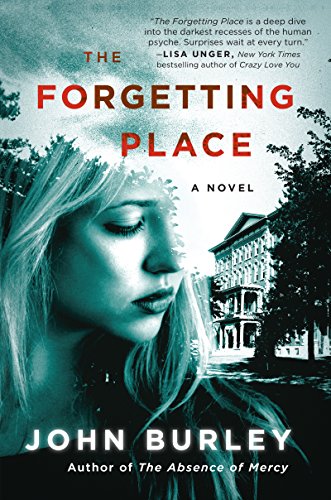The Forgetting Place by John Burley
If you’ve ever watched an episode Law & Order and wondered, “Hey, where does that guy end up now that he’s been found not guilty by reason of insanity?” one answer is Menaker State Hospital, the setting for John Burley’s creepy new thriller The Forgetting Place. In the novel, Dr. Lise Shields, a Menaker psychiatrist, is tasked with unraveling the story of Jason Edwards, a new patient who mysteriously arrives at the hospital with no paperwork or court history.
Burley spoke to BookTrib about his own medical background, how he researches a book, and even what he’d pack for a trip to asylum.
BOOKTRIB: How did your background as an emergency room physician contribute to the writing of this book?
John Burley: The Forgetting Place is told from the perspective of Dr. Lise Shields, a psychiatrist at a state correctional facility for patients who’ve committed heinous crimes but have been deemed either incompetent to stand trial or not criminally responsible by reason of insanity. My medical training provided me with an understanding of psychiatric illnesses and the symptoms encountered by many of these patients. The novel also depicts the difficult and sometimes dangerous job of treating potentially volatile patients who have a proclivity toward violence—something we encounter all too frequently in the emergency department.
BT: Psychiatric institutions like Menaker State Hospital probably aren’t places you can walk into off the street and start asking questions. How did you research the “asylums” on which you based Menaker?
JB: During my medical school psychiatry rotation, I spent six weeks assisting with the treatment of patients at Elgin Mental Health Center, a vast 582-bed facility operated by the state of Illinois and primarily used to treat patients who the judicial system has determined are either unfit to stand trial or not guilty by reason of insanity. Originally called the Northern Illinois Hospital and Asylum for the Insane, Elgin provided me with an invaluable introduction to the treatment of patients with severe mental illness. The time I spent there is an experience I will never forget.
BT: Protection is a key theme in The Forgetting Place, from Dr. Shields wanting to protect her vulnerable patient to siblings’ desire to protect each other from harm. What appealed to you about exploring this idea within the context of a thriller?
JB: Protection is a universal need, for the world can be a dangerous place. I wanted to explore the measures we are willing to take to safeguard the welfare of ourselves and those we love. But what interested me most is that protection can be a double-edged sword. In order to protect, we must be willing to act. There is an implicit potential for violence in our response to those things that threaten us. And controlling that violence—holding it at bay until it is clearly necessary—is no simple task. There is a tendency for us to go too far, or not far enough. When is protection, I wondered, more dangerous than the original threat? The Forgetting Place challenges the reader to consider this question as the protection and threats of Menaker State Hospital continue to unfold, blending into each other until they are as indistinguishable as the infinite caverns of the human mind.
BT: The various government agencies at play in the novel, including the CIA and the FBI, underscore the warning “trust no one.” How did you keep all the plot twists and loyalty shifts straight when you were writing? Do you outline a book before you begin?
JB: I prefer not to outline the course a story will take. I know where I want to begin and how I’d like things to end, but connecting those two points is a big part of the fun of writing a novel. Plot twists work best when they’re organic—when they surprise the author as much as the reader—and putting it all in outline form at the beginning detracts from that spontaneity, at least for me. It’s a risky way to write a novel, I’ll admit, and there are times when it gets me into trouble. But it keeps the work fresh and exciting, which is exactly the point of a good thriller.
BT: If you were about to be committed to a Menaker-type hospital and were only allowed to bring three books with you, what would you bring?
JB: Lord of the Flies—because in a state correctional hospital, the usual social constructs do not apply.
One Flew Over the Cuckoo’s Nest—because sooner or later, I’d identify with most of the characters.
The Great Escape—because let’s face it: everyone needs something to strive for.
Buy this Book!
Amazon





